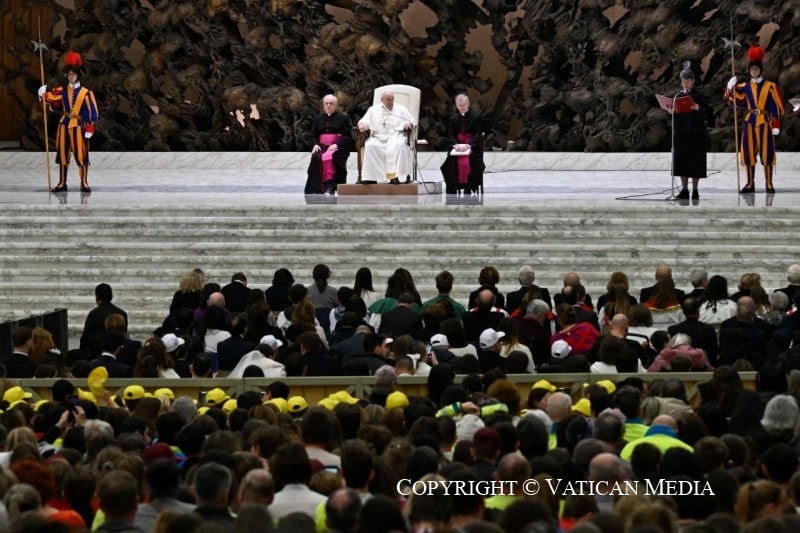“The acidic does not diligently carry out the work of God”
General Audience - Catechesis. The vices and virtues. 8. Sloth

This morning’s General Audience took place at 9.00 in the Paul VI Hall, where the Holy Father Francis met groups of pilgrims and faithful from Italy and all over the world.
In the speech in Italian, the Pope, continuing the cycle of catechesis on “The vices and virtues”, focused his reflection on the theme of sloth (Reading: Mt 26,36.40-41).
After summarizing his catechesis in the different languages, the Holy Father addressed particular greetings to the faithful present.
The General Audience concluded with the recitation of the Pater Noster and the Apostolic Blessing.
Catechesis of the Holy Father
The following text includes parts that were not read out loud, but should be considered as such.
Cycle of Catechesis. Vices and Virtues. 8. Acedia
Dear brothers and sisters,
Among all the capital sins there is one that is often overlooked, perhaps because of its name, which is often incomprehensible to many: I am talking about acedia. Therefore, in the list of vices, the term acedia is often substituted by another, much more commonly used: sloth, or laziness. In reality, laziness is an effect more than a cause. When a person is idle, indolent, apathetic, we say he is lazy. But as the wisdom of the ancient desert fathers teaches us, often the root of this laziness is acedia, which from its Greek origin literally means a “lack of care”.
 It is a very dangerous temptation, which one must not joke about. It is as though those who fall victim to it are crushed by a desire for death: they feel disgust at everything; the relationship with God becomes boring to them; and even the holiest acts, those that in the past warmed their hearts, now appear entirely useless to them. A person begins to regret the passing of time, and the youth that is irretrievably behind them.
It is a very dangerous temptation, which one must not joke about. It is as though those who fall victim to it are crushed by a desire for death: they feel disgust at everything; the relationship with God becomes boring to them; and even the holiest acts, those that in the past warmed their hearts, now appear entirely useless to them. A person begins to regret the passing of time, and the youth that is irretrievably behind them.
Acedia is defined as the “noonday demon”: it grips us in the middle of the day, when fatigue is at its peak and the hours ahead of us seem monotonous, impossible to live. In a famous description, the monk Evagrius represents this temptation thus: “The eye of the slothful person is continually fixed on the windows, and in his mind he fantasizes about visitors […] When he reads, the slothful person often yawns and is easily overcome by sleep, wrinkles his eyes, rubs his hands and, withdrawing his eyes from the book, stares at the wall; then turning them back to the book, he reads a little more […]; finally, bowing his head, he places the book underneath it, and falls into a light sleep, until hunger awakens him and urges him to attend to his needs”; in conclusion, “the slothful man does not do God’s work with solicitude” [1].
Contemporary readers perceive in these descriptions something that closely recalls the evil of depression, both from a psychological and a philosophical point of view. Indeed, for those who are gripped by acedia, life loses its significance, prayer becomes boring, and every battle seems meaningless. If in youth we nurtured passions, now they seem illogical, dreams that did not make us happy. So, we let ourselves go, and distraction, thoughtlessness, seem to be the only ways out: one would like to be numb, to have a completely empty mind… It is a little like dying in advance, and it is ugly.
 Faced with this vice, which we recognize to be very dangerous, the masters of spirituality envisage various remedies. I would like to note one that to me seems most important, and which I would call the patience of faith. Although in the clutches of acedia, man’s desire is to be “elsewhere”, to escape from reality, one must instead have the courage to remain and to welcome God’s presence in the “here and now”, in the situation as it is. The monks say that for them the cell is the best teacher of life, because it is the place that concretely and daily speaks to you of your love story with the Lord. The demon of acedia wants precisely to destroy this simple joy of the here and now, this grateful wonder of reality; it wants to make you believe that it is all in vain, that nothing has meaning, that it is not worth taking care of anything or anyone. In life we meet slothful people, people about whom we say, “He is boring!”, and we do not like to be with them; people who even have an attitude of boredom that is infectious. This is acedia.
Faced with this vice, which we recognize to be very dangerous, the masters of spirituality envisage various remedies. I would like to note one that to me seems most important, and which I would call the patience of faith. Although in the clutches of acedia, man’s desire is to be “elsewhere”, to escape from reality, one must instead have the courage to remain and to welcome God’s presence in the “here and now”, in the situation as it is. The monks say that for them the cell is the best teacher of life, because it is the place that concretely and daily speaks to you of your love story with the Lord. The demon of acedia wants precisely to destroy this simple joy of the here and now, this grateful wonder of reality; it wants to make you believe that it is all in vain, that nothing has meaning, that it is not worth taking care of anything or anyone. In life we meet slothful people, people about whom we say, “He is boring!”, and we do not like to be with them; people who even have an attitude of boredom that is infectious. This is acedia.
How many people, in the grip of acedia, stirred by a faceless restlessness, have stupidly abandoned the good life they had embarked upon! The battle of acedia is a decisive one, that must be won at all costs. And it is a battle that did not spare even the saints, because in many of their diaries there are some pages that confide terrible moments, of genuine nights of the faith, when everything appears dark. These saints teach us to get through the night in patience, accepting the poverty of faith. They recommended, under the oppression of sloth, to maintain a smaller measure of commitment, to set goals more within reach, but at the same time to endure and persevere by leaning on Jesus, who never abandons us in temptation.
Faith, tormented by the test of acedia, does not lose its value. On the contrary, it is the true faith, the very human faith, which despite everything, despite the darkness that blinds it, still humbly believes. It is that faith that remains in the heart, like embers beneath the ashes. It always remains. And if one of us falls prey to this vice, or to the temptation of acedia, try to look within and fan the embers of faith; that is how we keep going.
_______________________________
[1] Evagrius Ponticus, The Eight Spirits of Evil, 14.
_____________________________

Special Greetings
I extend a warm welcome to the English-speaking pilgrims and visitors taking part in today’s Audience, especially the groups from England, Wales, Nigeria, Korea and the United States of America. As we begin this season of Lent, I invoke upon all of you the joy and peace of our Lord Jesus Christ. God bless you!
______________________
Summary of the Holy Father’s words
In our reflections on the vices and virtues, we now consider acedia or sloth, which, although associated in English with laziness, is above all a deep spiritual apathy, manifested by discontent and aversion to attentive prayer and growth in our relationship with God. According to the monastic tradition, this “noonday devil” is best overcome by the patience of faith. This includes accepting the poverty or dark night of faith, which then enables us, by God’s grace, to sense the divine presence and to continue to reach out to God. The saints themselves show us that perseverance in time of temptation leads us to set practical goals, however small, for our daily life and moves us to lean on Jesus, who always remains with us.
Related

The Pope to the Salesians: “Serve others without holding anything back”
Irene Vargas
07 April, 2025
2 min

The Pope: In convalescence, I feel the “finger of God” and experience his loving caress
Exaudi Staff
06 April, 2025
2 min

The experience of illness, a school in which we learn every day to love and to allow ourselves to be loved
Exaudi Staff
06 April, 2025
6 min

Francis is gradually improving: signs of recovery at the Vatican
Exaudi Staff
04 April, 2025
1 min
 (EN)
(EN)
 (ES)
(ES)
 (IT)
(IT)

